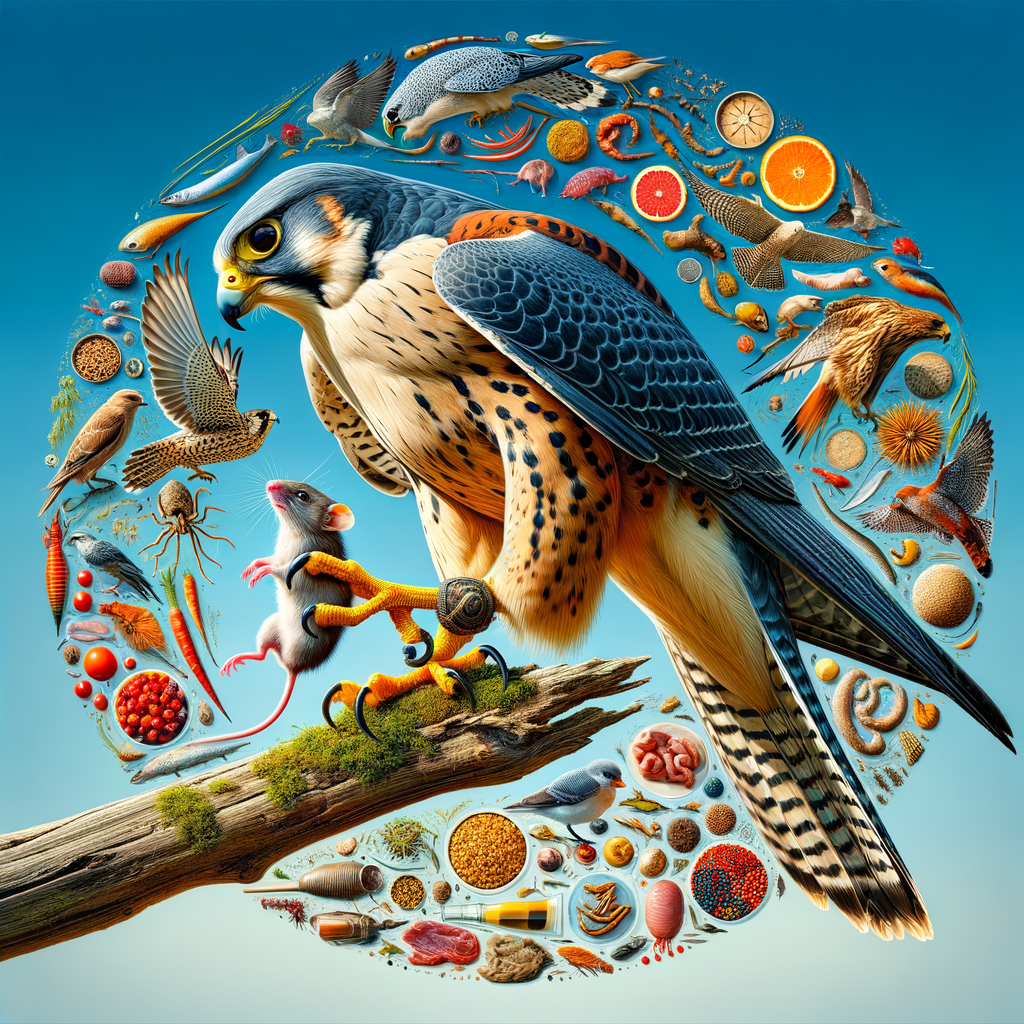Essential Falcon Nutrition Tips
- Balanced Diet: Falcons need a balanced diet to stay healthy and strong. Make sure to include variety in their meals.
- Fresh Meat: Always give falcons fresh meat like quail, pigeon, or rabbit. Avoid processed or spoiled food.
- Supplements: Sometimes, falcons may require vitamin or mineral supplements to stay in peak condition.
- Hydration: Ensure falcons have access to clean water. They need it for digestion and overall health.
- Meal Timing: Feed falcons at regular intervals to keep their metabolism steady.
- Weight Monitoring: Keep an eye on your falcon’s weight. It’s a good indicator of their health and diet balance.
- Food Storage: Store food properly to avoid spoilage and contamination.
- Observation: Watch how your falcon eats. Changes in eating habits can signal health issues.
- Consult Experts: Always reach out to a falconry expert if you’re unsure about the diet.
These points are crucial for keeping falcons in top shape and ensuring they thrive in their environment.
Unmasking the Secrets of Basic Falcon Nutrition
Top o’ the mornin’ to ya, fellow falcon enthusiasts! Welcome to the Learn Falconry family, where we don’t just fly high, but soar with knowledge. Ever wondered what keeps your majestic falcon as sprightly as an Irish jig? Well, your curiosity has led you to the right place. Just as a hearty bowl of Irish stew keeps us warm and full of energy, the right nutrition does wonders for our feathered friends.
Grab a comfortable seat and cozy up because what we’re about to share will change the way you feed your falcon forever. Let’s dive into the essential bits and bobs of basic falcon nutrition. Understanding this will not only boost your falcon’s health but also strengthen the unspoken bond of trust and companionship you share.
You see, falcons aren’t just ordinary birds’they are incredible hunters with specific dietary needs that make them the stunning creatures they are. Picture a mighty falcon flying through the lush Irish landscape, needing every ounce of nutrition to keep its wings strong and eyes sharp.
So, why is it critical to understand what goes into your falcon’s diet? Think of it as tuning an Irish fiddle; the better you know your instrument, the more beautiful the melody it produces. Your falcon’s performance and well-being depend on just the right mix of nutrients. We’ve gathered some top tips and must-know facts to ensure your falcon isn’t just surviving but thriving’just the way nature intended.
Stick with us, and we’ll unfold the layers of a balanced falcon diet that’s as spirited as an emerald isle celebration. Your feathered companion will thank you with many victorious flights, promising thrills and adventures as captivating as the Irish folklore.
Ready to turn the page? Let’s journey together through the lanes of essential falcon nutrition. You won’t want to miss a beat!
Soaring alongside,
Learn Falconry Team
Understanding Basic Falcon Nutrition
Falcon nutrition is a vital aspect of keeping your bird healthy and happy. Falcons are birds of prey, which means they need a specific diet to match their high-energy lifestyle. Let’s explore the essentials of feeding falcons and what makes up a proper falcon diet.
Falcons Need Protein-Rich Food
Falcons are carnivores, so their diet should primarily consist of meat. Their feeding habits in the wild give us a good idea of what they need. In the wild, falcons typically prey on small mammals, birds, and sometimes insects. When planning a diet for your falcon, you should aim to replicate this as closely as possible. Common foods include:
- Mice and Rats: These should be a staple in a falcon’s diet due to their high protein and fat content.
- Birds: Quail, pigeons, and chicks are excellent protein sources.
- Supplements: Even the best diet might need supplements to ensure your falcon gets all the necessary vitamins and minerals.
Importance of Variety in Falcon Diet
Just like people, falcons benefit from a varied diet. Different foods provide different nutrients that are essential for overall health. Rotating between different types of prey can help ensure that they receive a well-rounded diet.
Feeding Falcons: How Much and How Often?
The amount and frequency of feeding your falcon depend on its activity level, age, and health. For example, a very active falcon used in regular hunting might require more food compared to one that is less active. On average, a falcon might eat around 10-20% of its body weight each day. It’s essential to monitor your bird’s weight regularly to ensure it is not under or overfed.
Hydration Needs
While falcons get some moisture from their food, clean drinking water should always be available. Proper hydration is crucial for their metabolism and overall health.
Special Nutritional Considerations
When feeding falcons, it’s not just about giving them meat. You need to be aware of the balance between protein, fat, and other nutrients.
- Calcium: This is essential for bone health. Providing small bones with their meat can be beneficial.
- Vitamins and Minerals: These can be added through specialized supplements designed for birds of prey.
Avoid These Common Mistakes
Sometimes, well-meaning falconers might make mistakes in feeding falcons. Here are a few common ones to avoid:
- Overfeeding or Underfeeding: Both can lead to health problems. Regular weighing helps keep this in check.
- Improper Prey Items: Using wild-caught prey without ensuring it’s safe can introduce diseases.
Learning More About Falcon Nutrition
Understanding all aspects of falcon nutrition can be complex, but it is essential for the well-being of your bird. For more detailed information, you can visit our Falcon Health and Nutrition page.
To further enhance your knowledge, check out our resources on Falconry Techniques and Training a Falcon. These can provide additional insights into how proper nutrition ties into overall training and care.
By ensuring knowledgeable and thoughtful feeding practices, you help maintain your falcon’s health and readiness for all activities. For more beginner tips, visit our Falconry for Beginners section.
Remember, a well-nourished falcon is not only healthier but also more agile and responsive, making it a more effective hunting companion and a happier bird overall.
Additional Resources on Falconry
Each of these topics will help you understand more about the fascinating world of falconry and how to better care for your feathered friend.
Basic Falcon Nutrition
Falcons are incredible birds of prey that have special dietary needs to stay healthy and strong. Depending on the species, their diet can vary, but it primarily consists of meat. Let’s explore the nutrition required for Saker Falcons, Prairie Falcons, and Peregrine Falcons, which are some of the well-known falcon species.
Saker Falcon Diet
Saker Falcons are mainly carnivorous and have a strong preference for rodents and birds. Here is a look at their typical diet:
- Common Prey in Europe:
- Ground Squirrels
- Feral Pigeons
Prairie Falcon Diet
Prairie Falcons have a more diverse diet consisting of small mammals and birds. Their diet changes slightly depending on the season.
Summer Diet:
- Small Mammals:
- Squirrels
- Ground Squirrels
- Prairie Dogs
- Chipmunks
- Gophers
- Rabbits
- Small Mammals:
Bird Prey:
- Sparrows
- Starlings
- Grackles
- Doves
- Quail
- Meadow Larks
- Pigeons
- Coots
- Teal
- Mallards
Peregrine Falcon Diet
Peregrine Falcons are known for their speed and precision in hunting. They mainly consume other birds but also include small reptiles and mammals in their diet.
Primary Diet:
- Birds:
- Mourning Doves
- Pigeons
- Various other bird species
- Birds:
Additional Prey:
- Small Reptiles
- Mammals (such as bats, voles, lemmings, squirrels, and rats)
Falcon Diet Comparison Table
| Falcon Species | Common Prey | Additional Prey |
|---|---|---|
| Saker Falcon | Ground Squirrels, Feral Pigeons | |
| Prairie Falcon | Squirrels, Ground Squirrels, Prairie Dogs, Chipmunks, Gophers, Rabbits | Sparrows, Starlings, Grackles, Doves, Quail, Meadow Larks, Pigeons, Coots, Teal, Mallards |
| Peregrine Falcon | Mourning Doves, Pigeons, Various Other Birds | Small Reptiles, Bats, Voles, Lemmings, Squirrels, Rats |
Understanding the nutrition needs of these fascinating birds not only helps in their well-being but also aids in their conservation and management.
These dietary patterns ensure that these birds are well-fed and equipped for their daily activities, including hunting and potential breeding efforts.
Key Insights on Basic Falcon Nutrition
It’s vital to understand the unique dietary needs to keep falcons healthy and strong. Falcons, such as the Saker, Prairie, and Peregrine Falcons, primarily eat a diverse diet of birds, small mammals, and occasionally reptiles. Each species has its specific prey preferences. For example, Saker Falcons often hunt rodents and birds like ground squirrels and pigeons, while Prairie Falcons prefer mammals such as prairie dogs and rabbits, and birds like starlings and doves. Peregrine Falcons mainly focus on other birds like pigeons and doves.
By knowing these dietary details, caretakers can ensure that their falcons get the proper nutrition they need to thrive in their environments. Proper nutrition is crucial not only for the bird’s health but also for their ability to breed and continue their species. So whether you are a seasoned falconer or just starting, keep these critical aspects of falcon nutrition in mind to ensure the well-being of your majestic birds.



